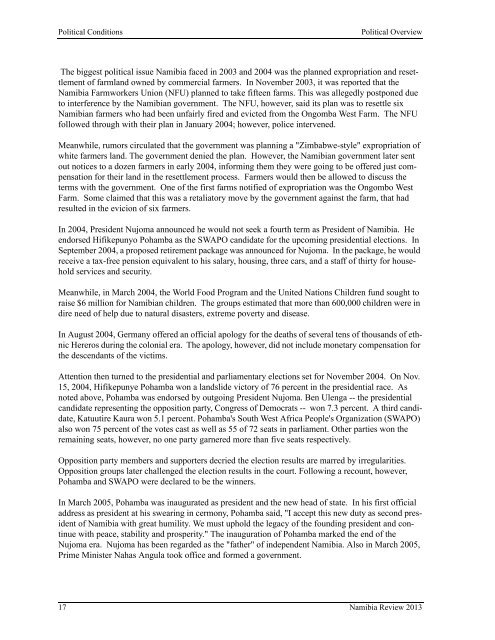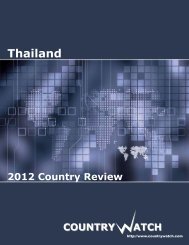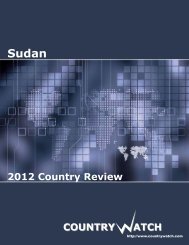Namibia - CountryWatch
Namibia - CountryWatch
Namibia - CountryWatch
Create successful ePaper yourself
Turn your PDF publications into a flip-book with our unique Google optimized e-Paper software.
Political Conditions Political Overview<br />
The biggest political issue <strong>Namibia</strong> faced in 2003 and 2004 was the planned expropriation and resettlement<br />
of farmland owned by commercial farmers. In November 2003, it was reported that the<br />
<strong>Namibia</strong> Farmworkers Union (NFU) planned to take fifteen farms. This was allegedly postponed due<br />
to interference by the <strong>Namibia</strong>n government. The NFU, however, said its plan was to resettle six<br />
<strong>Namibia</strong>n farmers who had been unfairly fired and evicted from the Ongomba West Farm. The NFU<br />
followed through with their plan in January 2004; however, police intervened.<br />
Meanwhile, rumors circulated that the government was planning a "Zimbabwe-style" expropriation of<br />
white farmers land. The government denied the plan. However, the <strong>Namibia</strong>n government later sent<br />
out notices to a dozen farmers in early 2004, informing them they were going to be offered just compensation<br />
for their land in the resettlement process. Farmers would then be allowed to discuss the<br />
terms with the government. One of the first farms notified of expropriation was the Ongombo West<br />
Farm. Some claimed that this was a retaliatory move by the government against the farm, that had<br />
resulted in the evicion of six farmers.<br />
In 2004, President Nujoma announced he would not seek a fourth term as President of <strong>Namibia</strong>. He<br />
endorsed Hifikepunyo Pohamba as the SWAPO candidate for the upcoming presidential elections. In<br />
September 2004, a proposed retirement package was announced for Nujoma. In the package, he would<br />
receive a tax-free pension equivalent to his salary, housing, three cars, and a staff of thirty for household<br />
services and security.<br />
Meanwhile, in March 2004, the World Food Program and the United Nations Children fund sought to<br />
raise $6 million for <strong>Namibia</strong>n children. The groups estimated that more than 600,000 children were in<br />
dire need of help due to natural disasters, extreme poverty and disease.<br />
In August 2004, Germany offered an official apology for the deaths of several tens of thousands of ethnic<br />
Hereros during the colonial era. The apology, however, did not include monetary compensation for<br />
the descendants of the victims.<br />
Attention then turned to the presidential and parliamentary elections set for November 2004. On Nov.<br />
15, 2004, Hifikepunye Pohamba won a landslide victory of 76 percent in the presidential race. As<br />
noted above, Pohamba was endorsed by outgoing President Nujoma. Ben Ulenga -- the presidential<br />
candidate representing the opposition party, Congress of Democrats -- won 7.3 percent. A third candidate,<br />
Katuutire Kaura won 5.1 percent. Pohamba's South West Africa People's Organization (SWAPO)<br />
also won 75 percent of the votes cast as well as 55 of 72 seats in parliament. Other parties won the<br />
remaining seats, however, no one party garnered more than five seats respectively.<br />
Opposition party members and supporters decried the election results are marred by irregularities.<br />
Opposition groups later challenged the election results in the court. Following a recount, however,<br />
Pohamba and SWAPO were declared to be the winners.<br />
In March 2005, Pohamba was inaugurated as president and the new head of state. In his first official<br />
address as president at his swearing in cermony, Pohamba said, "I accept this new duty as second president<br />
of <strong>Namibia</strong> with great humility. We must uphold the legacy of the founding president and continue<br />
with peace, stability and prosperity." The inauguration of Pohamba marked the end of the<br />
Nujoma era. Nujoma has been regarded as the "father" of independent <strong>Namibia</strong>. Also in March 2005,<br />
Prime Minister Nahas Angula took office and formed a government.<br />
17 <strong>Namibia</strong> Review 2013




